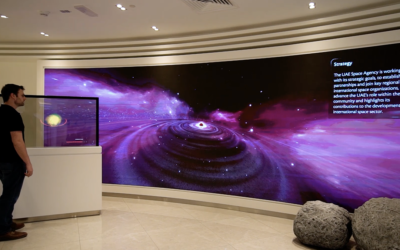

Mass adoption of virtual events
Virtual events have gained traction even before the pandemic, with its greater convenience and lower overheads compared to physical events. The onset of the pandemic has accelerated adoption as international travel has dipped severely and social distancing measures have reduced capacities for domestic events. Industries including manufacturing, healthcare and even consumer staples used to leverage heavily on physical events to boost revenues, but even traditional sectors have had to grapple with the fallout of the pandemic and be more creative in engaging their consumers. There is no need to fret as there are plenty of advantages to virtual events that make it a go-to in the new normal!

Virtual networking
Working professionals from around the globe fly in for trade shows and expos as in-person events allow them to connect with others in their industry at close proximity that rarely takes place in the work year. Despite travel restrictions due to the pandemic, professionals can still connect via virtual breakout rooms that can be designated as lounge areas, away from the affairs of the main convention. This may sound a little unusual or even awkward, but the trick here is to ease the attendees in by providing interactive points of discussion, hot-button topics or even elements of gamification to encourage meaningful virtual conversations.

Live Streaming shoppertainment
Live streaming has taken off exponentially during the pandemic. We have seen the acceleration of singles day sales “events” by e-commerce platforms, with China leading the way in “shoppertainment”. Online retail has taken a new and improved form with the use of influencers to host shopping events, which has seen products sell out within minutes. With live streaming, brands can conveniently announce the launch of new products, offer updates and even conduct surprise giveaways – no matter the geographical region. Most live streamers rely on endorsement deals as their main source of income. For brands hoping to utilise live streams as part of their marketing strategy, it is vital to identify a representative that can capture the attention of your consumers, epitomize your brand, and be able to sell your product or vision.

Recognition events
Recognition events are vital, as they offer acknowledgement and incentives for your employees and participants. One of the key challenges of a virtual recognition event is the lack of audience engagement, which can end up losing the hype or feel of a celebration. With physical events, peer-to-peer recognition is immediately established as awardees are recognised publicly. With virtual events, participants may not focus their undivided attention or be as engaged. This leads to more muted celebrations and consequently the institution’s invalidating culture. By including gamification elements, such as team or individual games, or a leaderboard, the competition can help to generate engagement and interest.

Team building events
Now that mental health has become a buzz-word in the new normal, companies have gone the extra mile to ensure greater staff welfare, which includes the greater use of team building activities online. Brought right to the comfort of your own home, the options for virtual team building activities have increased significantly. Some popular activities include live cooking demonstrations, yoga sessions, perfume making and even birthday celebrations. First, you need to consider which virtual platform works for your objectives, as different software achieves different results with engagement and interaction. Second, market your event to your participants to better understand any individual requirements for the chosen event to generate buzz and momentum. Last but not least, if there is event swag, ensure that this is mailed out ahead of time so that participants are equipped to immerse themselves in your chosen activity.

Prominent keynote speakers
Planning a virtual event around prominent keynote speakers is a staple in many industries, because it helps to chart a clear path for personal development and organisational growth. Most importantly, keynote speakers are usually industry leaders that deliver engaging speeches that are littered with anecdotes and real-life experiences, which helps to generate thought-provoking discourse in participants. If this is not the case, then it is important to re-think how your content is being presented to your audience! Ultimately, good speakers can help you to reinforce your industry’s best practices or help to announce the latest advancements, but only if your audience is receptive to their message.

Educational competitions/hackathons
Competitions or hackathons are usually organised by educational organisations or companies to bring young talent together to exchange ideas and build a shared community. Organising a virtual hackathon requires an understanding of your stakeholders’ considerations, which is why identifying and defining clear objectives becomes important. One of the common objectives of these events is for companies to scout for talent and ideas, since hackathons can bring about a re-imagining in thinking about problems and solutions. The judging panels are often of interest to competitors, as these are good networking opportunities for them and usually act as the event sponsors. The crux of virtual hackathons ultimately is to pool together a diverse group of talent that can increase the ideational space for the entire community that is a part of it. To maximise success for such events, it is important to plan ahead of time, set your objectives, and consider varied activities that can bring about collaboration or competition in the best possible forum.

Comedy specials/concerts
Comedy specials have gained traction ever since Netflix started releasing stand up content as a default part of its streaming service. During global lockdowns in 2020, “streaming” parties began popping up on people’s calendar invites. Essentially, Netflix opened the door towards virtual participation where people could watch the same content from different locations, while still being able to chat or interact. This could open the door towards virtual streaming events, where organisations can organise parties based on showing their staff exclusive content, such as paying for Disney+’s premier access, which allows select films that would only be shown in the cinema otherwise. Live entertainment online has also increased in popularity, as musicians have sold out tickets for their concerts. Virtual entertainment should not be under-estimated as ticket sales have proved. They are more cost-friendly and could be a great way for your teams to attend exciting and interesting events which would otherwise not be possible.

Virtual trade shows
Trade expos, conventions and industry fairs were fantastic ways for company representatives to exchange ideas and conduct business dealings. While the new normal has seen an increase in this traffic going virtual, companies would be mistaken to think that this has taken away the value of attending these events. With virtual trade shows, overheads are greatly reduced as costs for physical events like location rental, labour and even food catering are no longer in the picture. Sales opportunities are still present, because virtual meetings offer a higher level of penetration, even if the in person experience is still preferred. Ultimately, more attendees globally can conveniently access the event especially for those that were previously restricted by geographical challenges. To make your event stand out, consider adding spice by introducing elements that are different to a physical event. This could include implementing new technology, such as fully 3D rendered environments, augmented reality, and gamification across segments to incentivise and interest participants. It is important to move away from comparing virtual trade shows to their physical counterparts, and look at how event / exhibition objectives can be met in a different way than before.



